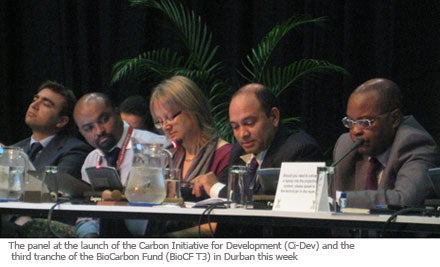
During this week in Durban, we announced two new financial initiatives designed to help the least-developed countries access financing for low-carbon investments and enable them to tap into carbon markets after 2012 - the Carbon Initiative for Development (Ci-Dev) and the third tranche of the BioCarbon Fund (BioCF T3).
The funds, focused on agriculture and access to energy, are designed to strengthen links to private sources of capital via carbon markets for some of the world's poorest communities.
The new instruments will help client countries to buy carbon credits from a range of projects including household biogas systems in Nepal, cook stoves in Africa, reforestation in the Democratic Republic of Congo, soil carbon in Kenya, and municipal solid waste in Uganda.
Ci-Dev, aiming to raise USD 120 million, is a partnership of donor and recipient countries, where public and private sector are pledging their support to capacity building and carbon market development in the poorest countries of the world.
The second initiative, the BioCF T3, will focus on reforestation and agriculture projects.
The agriculture projects are another example of the climate-smart agriculture we have been talking about all week – and deliver a triple win of increased food security and resilience through reduced soil erosion and increased land fertility as well as the access to new carbon markets.
Several civil society groups are nervous that the quest for mitigation will produce projects that don’t work for those whose livelihoods depend on the landscapes we seek to protect. However, I feel we and our partners have made progress these last two weeks in clarifying the fact that our work is effectively adaptation-based mitigation. Indeed, adaptation is the primary benefit and mitigation, the co benefit of much of this work.
By focusing on forestry and agriculture, the projects will develop new opportunities in crucial sectors, recognizing the critical role of agriculture as the single-largest source of income, jobs, and livelihoods in the poorest countries.
Meanwhile our private sector partners see no evidence that climate change is going away, and emphasized they intend to stay in the carbon market for the long haul.
Follow Rachel Kyte's tweets (@RKyte365) at her liveblog from the COP17 conference in Durban


Join the Conversation